Abstract
Molecular biology has made tremendous strides over the last five years. The new biology allows us to prepare monoclonal antibodies to defined antigens; to detect, isolate and clone specific genes; and to insert these genes into defined sites in different cells giving new functions to old organisms. These revolutionary developments have been followed closely by researchers, businessmen, politicians and philosophers, as well as by those involved in the clinical care of patients. Although our understanding of human molecular biology is increasing rapidly, it is the development of monoclonal antibodies that has the most immediate application in the clinic. There have been several reports of their use in the diagnosis, localisation and treatment of human malignant disease. This review describes developments that are likely to have direct relevance to patient care in the near future.
Full text
PDF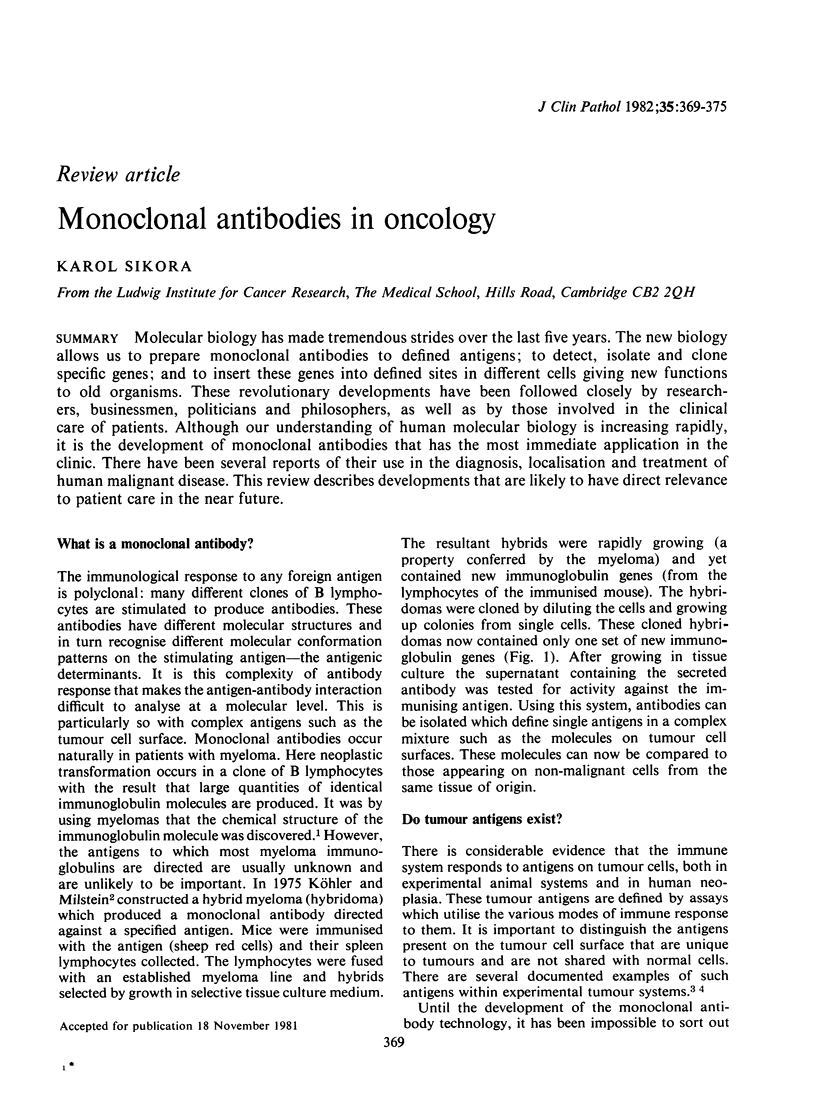
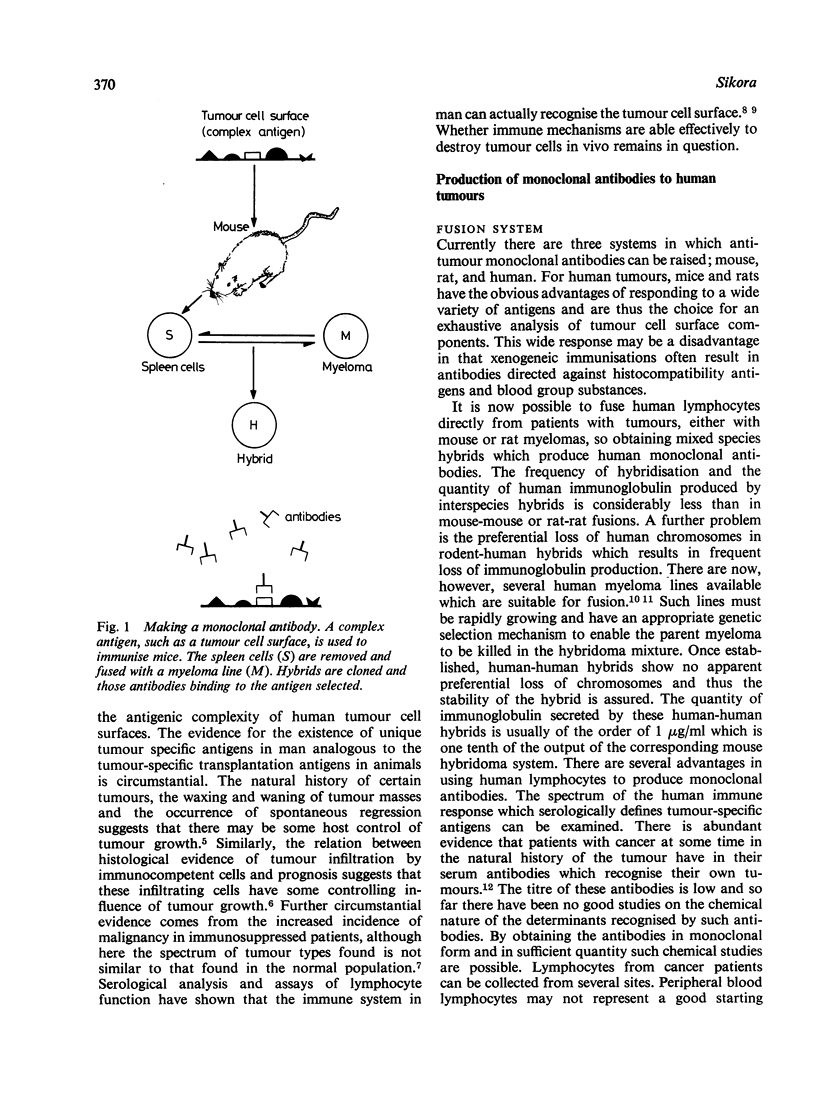
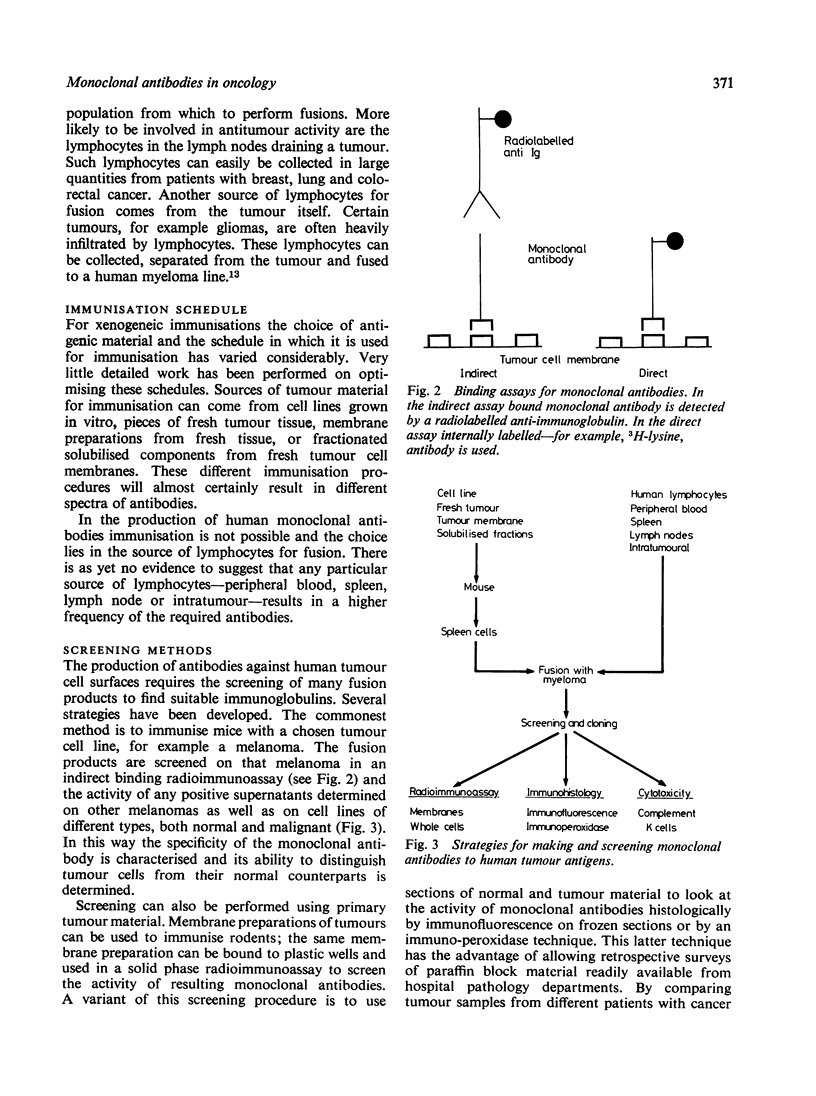
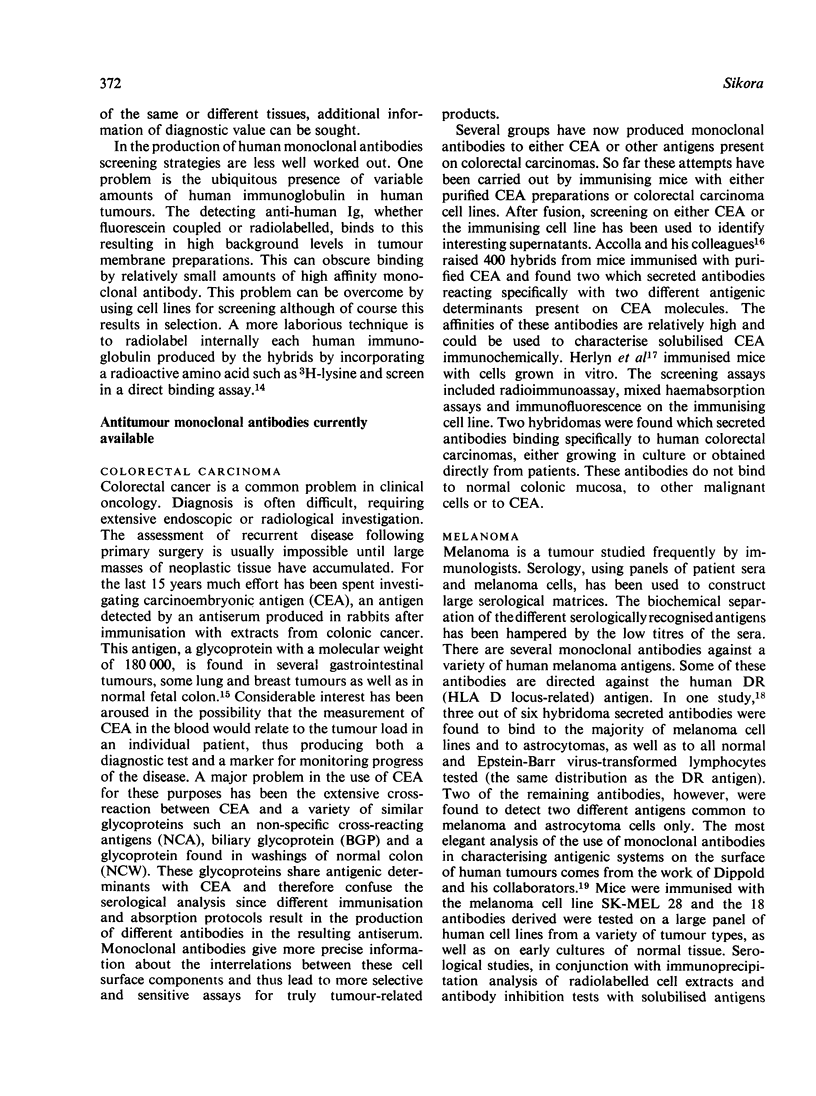
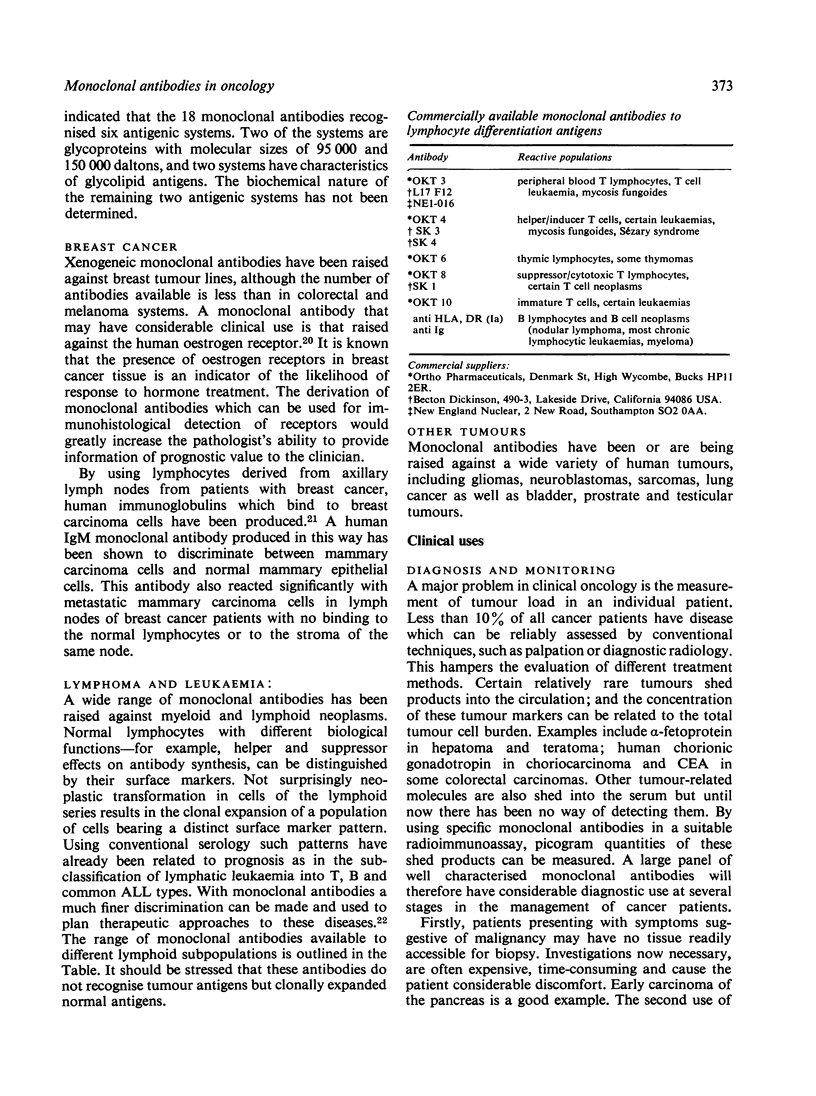
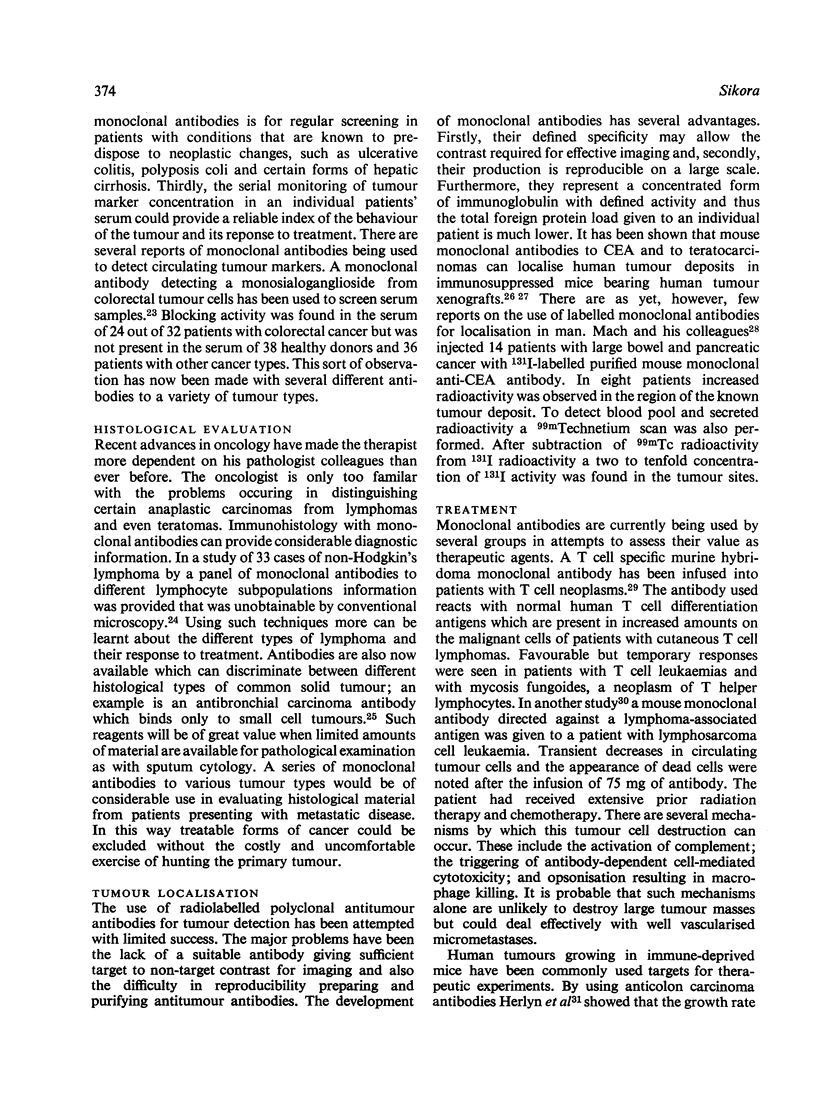
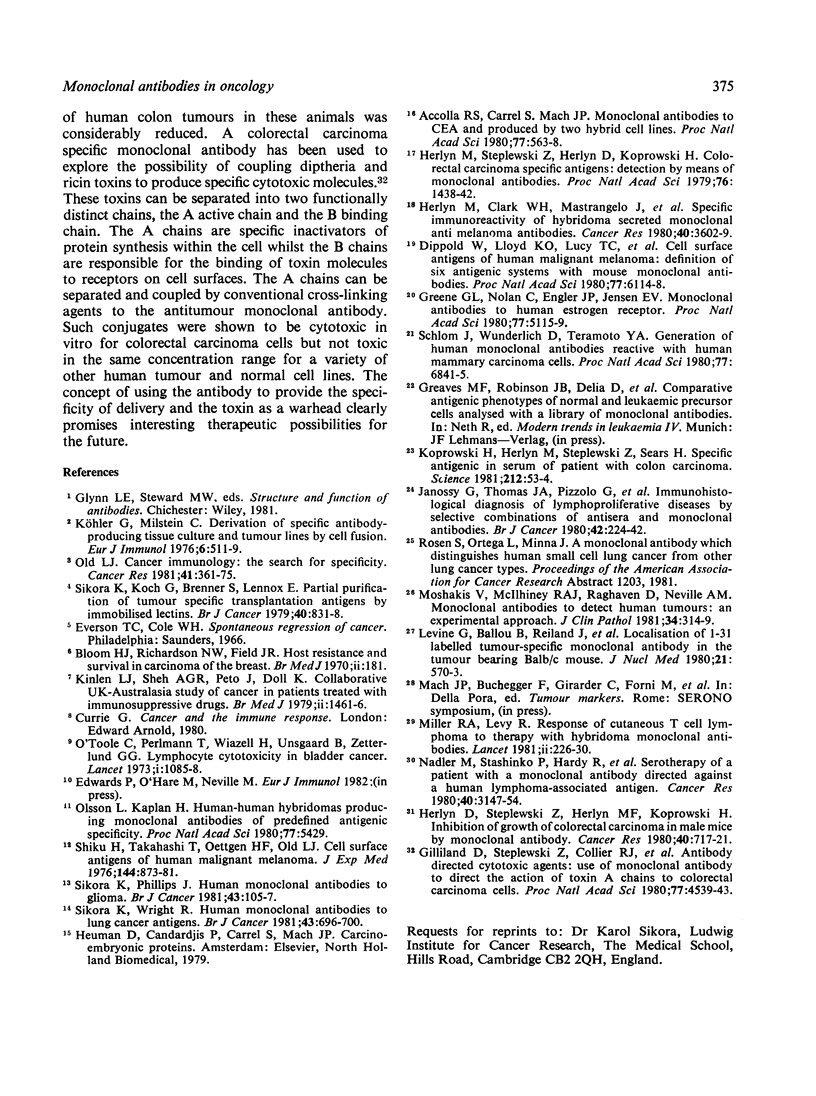
Selected References
These references are in PubMed. This may not be the complete list of references from this article.
- Accolla R. S., Carrel S., Mach J. P. Monoclonal antibodies specific for carcinoembryonic antigen and produced by two hybrid cell lines. Proc Natl Acad Sci U S A. 1980 Jan;77(1):563–566. doi: 10.1073/pnas.77.1.563. [DOI] [PMC free article] [PubMed] [Google Scholar]
- Bloom H. J., Richardson W. W., Field J. R. Host resistance and survival in carcinoma of breast: a study of 104 cases of medullary carcinoma in a series of 1,411 cases of breast cancer followed for 20 years. Br Med J. 1970 Jul 25;3(5716):181–188. doi: 10.1136/bmj.3.5716.181. [DOI] [PMC free article] [PubMed] [Google Scholar]
- Dippold W. G., Lloyd K. O., Li L. T., Ikeda H., Oettgen H. F., Old L. J. Cell surface antigens of human malignant melanoma: definition of six antigenic systems with mouse monoclonal antibodies. Proc Natl Acad Sci U S A. 1980 Oct;77(10):6114–6118. doi: 10.1073/pnas.77.10.6114. [DOI] [PMC free article] [PubMed] [Google Scholar]
- Gilliland D. G., Steplewski Z., Collier R. J., Mitchell K. F., Chang T. H., Koprowski H. Antibody-directed cytotoxic agents: use of monoclonal antibody to direct the action of toxin A chains to colorectal carcinoma cells. Proc Natl Acad Sci U S A. 1980 Aug;77(8):4539–4543. doi: 10.1073/pnas.77.8.4539. [DOI] [PMC free article] [PubMed] [Google Scholar]
- Greene G. L., Nolan C., Engler J. P., Jensen E. V. Monoclonal antibodies to human estrogen receptor. Proc Natl Acad Sci U S A. 1980 Sep;77(9):5115–5119. doi: 10.1073/pnas.77.9.5115. [DOI] [PMC free article] [PubMed] [Google Scholar]
- Herlyn D. M., Steplewski Z., Herlyn M. F., Koprowski H. Inhibition of growth of colorectal carcinoma in nude mice by monoclonal antibody. Cancer Res. 1980 Mar;40(3):717–721. [PubMed] [Google Scholar]
- Herlyn M., Clark W. H., Jr, Mastrangelo M. J., Guerry D. P., 4th, Elder D. E., LaRossa D., Hamilton R., Bondi E., Tuthill R., Steplewski Z. Specific immunoreactivity of hybridoma-secreted monoclonal anti-melanoma antibodies to cultured cells and freshly derived human cells. Cancer Res. 1980 Oct;40(10):3602–3609. [PubMed] [Google Scholar]
- Herlyn M., Steplewski Z., Herlyn D., Koprowski H. Colorectal carcinoma-specific antigen: detection by means of monoclonal antibodies. Proc Natl Acad Sci U S A. 1979 Mar;76(3):1438–1442. doi: 10.1073/pnas.76.3.1438. [DOI] [PMC free article] [PubMed] [Google Scholar]
- Janossy G., Thomas J. A., Pizzolo G., Granger S. M., McLaughlin J., Habeshaw J. A., Stansfeld A. G., Sloane J. Immuno-histological diagnosis of lymphoproliferative diseases by selected combinations of antisera and monoclonal antibodies. Br J Cancer. 1980 Aug;42(2):224–242. doi: 10.1038/bjc.1980.222. [DOI] [PMC free article] [PubMed] [Google Scholar]
- Kinlen L. J., Sheil A. G., Peto J., Doll R. Collaborative United Kingdom-Australasian study of cancer in patients treated with immunosuppressive drugs. Br Med J. 1979 Dec 8;2(6203):1461–1466. doi: 10.1136/bmj.2.6203.1461. [DOI] [PMC free article] [PubMed] [Google Scholar]
- Koprowski H., Herlyn M., Steplewski Z., Sears H. F. Specific antigen in serum of patients with colon carcinoma. Science. 1981 Apr 3;212(4490):53–55. doi: 10.1126/science.6163212. [DOI] [PubMed] [Google Scholar]
- Köhler G., Milstein C. Derivation of specific antibody-producing tissue culture and tumor lines by cell fusion. Eur J Immunol. 1976 Jul;6(7):511–519. doi: 10.1002/eji.1830060713. [DOI] [PubMed] [Google Scholar]
- Levine G., Ballou B., Reiland J., Solter D., Gumerman L., Hakala T. Localization of I-131-labeled tumor-specific monoclonal antibody in the tumor-bearing BALB/c mouse. J Nucl Med. 1980 Jun;21(6):570–573. [PubMed] [Google Scholar]
- Miller R. A., Levy R. Response of cutaneous T cell lymphoma to therapy with hybridoma monoclonal antibody. Lancet. 1981 Aug 1;2(8240):226–230. doi: 10.1016/s0140-6736(81)90475-x. [DOI] [PubMed] [Google Scholar]
- Moshakis V., McIlhinney R., Raghavan D., Neville A. M. Monoclonal antibodies to detect human tumours: an experimental approach. J Clin Pathol. 1981 Mar;34(3):314–319. doi: 10.1136/jcp.34.3.314. [DOI] [PMC free article] [PubMed] [Google Scholar]
- Nadler L. M., Stashenko P., Hardy R., Kaplan W. D., Button L. N., Kufe D. W., Antman K. H., Schlossman S. F. Serotherapy of a patient with a monoclonal antibody directed against a human lymphoma-associated antigen. Cancer Res. 1980 Sep;40(9):3147–3154. [PubMed] [Google Scholar]
- O'Toole C., Perlmann P., Wigzell H., Unsgaard B., Zetterlund C. G. Lymphocyte cytotoxicity in bladder cancer. No requirement for thymus-derived effector cells? Lancet. 1973 May 19;1(7812):1085–1088. doi: 10.1016/s0140-6736(73)90396-6. [DOI] [PubMed] [Google Scholar]
- Old L. J. Cancer immunology: the search for specificity--G. H. A. Clowes Memorial lecture. Cancer Res. 1981 Feb;41(2):361–375. [PubMed] [Google Scholar]
- Olsson L., Kaplan H. S. Human-human hybridomas producing monoclonal antibodies of predefined antigenic specificity. Proc Natl Acad Sci U S A. 1980 Sep;77(9):5429–5431. doi: 10.1073/pnas.77.9.5429. [DOI] [PMC free article] [PubMed] [Google Scholar]
- Schlom J., Wunderlich D., Teramoto Y. A. Generation of human monoclonal antibodies reactive with human mammary carcinoma cells. Proc Natl Acad Sci U S A. 1980 Nov;77(11):6841–6845. doi: 10.1073/pnas.77.11.6841. [DOI] [PMC free article] [PubMed] [Google Scholar]
- Shiku H., Takahashi T., Oettgen H. F. Cell surface antigens of human malignant melanoma. II. Serological typing with immune adherence assays and definition of two new surface antigens. J Exp Med. 1976 Oct 1;144(4):873–881. doi: 10.1084/jem.144.4.873. [DOI] [PMC free article] [PubMed] [Google Scholar]
- Sikora K., Koch G., Brenner S., Lennox E. Partial purification of tumour-specific transplantation antigens from methylcholanthrene-induced murine sarcomas by immobilized lectins. Br J Cancer. 1979 Dec;40(6):831–838. doi: 10.1038/bjc.1979.273. [DOI] [PMC free article] [PubMed] [Google Scholar]
- Sikora K., Phillips J. Human monoclonal antibodies to glioma cells. Br J Cancer. 1981 Jan;43(1):105–107. doi: 10.1038/bjc.1981.15. [DOI] [PMC free article] [PubMed] [Google Scholar]
- Sikora K., Wright R. Human monoclonal antibodies to lung-cancer antigens. Br J Cancer. 1981 May;43(5):696–700. doi: 10.1038/bjc.1981.101. [DOI] [PMC free article] [PubMed] [Google Scholar]



